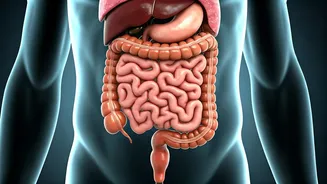Fiber-Rich Food Choices
Incorporating fiber-rich foods into your diet is a cornerstone of gut health. Indians can benefit from including plenty of options like whole grains (ragi,
bajra), lentils, beans, and fresh fruits and vegetables. These foods act as prebiotics, nourishing the beneficial bacteria in the gut. They also assist in regulating bowel movements, thus eliminating toxins, and contributing to overall digestive ease. Fiber-rich diets have the added benefit of promoting a feeling of fullness, which can aid in weight management and improve energy levels, making them a wise choice for long-term health.
Emphasizing Meal Frequency
Focusing on the frequency of meals, rather than skipping, can dramatically improve gut health. Instead of consuming large meals infrequently, it's beneficial to opt for smaller, balanced meals and snacks throughout the day. This approach helps the digestive system manage food more efficiently, preventing the excessive load often associated with infrequent eating. Regular mealtimes also help maintain a stable blood sugar level, which can reduce cravings, promote steady energy levels, and keep the gut microbiome happy. This method promotes a calmer digestive environment, which helps in better absorption of nutrients and reduces the possibilities of bloating.
Gut-Friendly Food Options
Selecting gut-friendly food alternatives can significantly enhance digestive health. Consider introducing fermented foods, such as yogurt or kefir, which are rich in probiotics. These beneficial bacteria directly support the gut microbiome, helping with digestion and boosting immunity. Including foods with anti-inflammatory properties, like turmeric, ginger, and garlic, can also soothe the gut lining. Moreover, incorporating foods that are low in processed sugars and refined carbohydrates helps to avoid feeding harmful bacteria, promoting a more balanced and healthier gut environment. Remember, consistency is crucial, so aim to include these foods regularly in your meals.
Stress Management Essential
Managing stress is vital for gut health, as it directly influences digestion and gut function. Chronic stress can disrupt the balance of the gut microbiome, making it more prone to inflammation and digestive issues. Practicing stress-reduction techniques such as deep breathing exercises, meditation, or yoga can help calm the nervous system, lessening the impact of stress on the gut. Incorporating relaxation activities into your daily routine and getting enough sleep also helps the body to cope with stress more effectively. By prioritizing stress management, individuals can support a healthier gut environment and promote overall well-being.
Prioritising Rest and Sleep
Prioritizing rest and quality sleep is fundamental for gut health. Lack of sleep can disrupt the natural balance of the gut microbiome, impacting digestive function and immune responses. Ensure you get 7-9 hours of sleep per night to allow your body to heal and regenerate. Establish a regular sleep schedule, create a relaxing bedtime routine, and keep your sleep environment comfortable and dark. Adequate rest allows the gut to repair and maintain its protective barrier, making it more resilient to stress and inflammation. This will also boost your energy levels and mood during the day, making it simpler to make healthier lifestyle choices.
The Role of Movement
Regular physical activity plays a key role in improving gut health. Exercise helps to stimulate the digestive system, increasing blood flow and promoting regular bowel movements. This avoids constipation and aids in removing toxins. Aim for at least 30 minutes of moderate-intensity exercise most days of the week. This can include activities like brisk walking, cycling, or dancing. Aside from its effects on the digestive system, exercise has overall positive effects on mood and stress levels, both of which are also significant for gut health. Regular movement contributes to a healthier, more balanced gut environment and increased energy levels.
Making Sustainable Changes
Adopting sustainable changes is essential for maintaining good gut health. It's not about quick fixes; it's about making long-term lifestyle changes that support overall well-being. Start by setting small, achievable goals, such as adding one new gut-friendly food to your diet each week. Monitor how your body reacts to these changes and adjust your routine accordingly. Educate yourself on gut health and related topics to make informed decisions. Remember, consistency and patience are critical. By implementing these practices consistently, you can cultivate a healthier gut and better overall well-being in the long run. Embracing a sustainable approach sets the stage for a lasting positive impact.













